Today marks the 50th anniversary of the United Kingdom’s nuclear weapons taking to sea on-board submarines.
50 years ago today HMS RESOLUTION, armed with Polaris missiles, sailed for her first deterrent patrol, marking the start of the submarine-based nuclear deterrent as the ultimate guarantor of our nation’s security. pic.twitter.com/CtebgKJPfS
— First Sea Lord (@AdmPhilipJones) June 15, 2018
The Royal Navy has operated the UK’s Continuous at Sea Deterrent since 1967 when the first SSBN – or Ship Submersible Ballistic Nuclear – HMS Resolution began patrolling armed with the Polaris missile system. The British Polaris programme was announced in December 1962 following the Nassau Agreement between the US and the UK. The Polaris Sales Agreement provided the formal framework for cooperation. Construction of the submarines began in 1964, and the first patrol took place in June 1968.
All four boats were operational in December 1969. They were operated by the Royal Navy, and based at Clyde Naval Base on Scotland’s west coast, a few miles from Glasgow. At least one submarine was always on patrol to provide a continuous at-sea deterrent, this has now been happening for 50 years.
Today, the Trident missile system is housed on the UK’s four Vanguard class submarines which form the UK’s strategic nuclear missile force. Each of the four boats are armed with up to 16 Trident II D5 SLBMs, carrying up to 8 warheads each. In 1996 HMS Vanguard, the first submarine armed with the Trident missile system, arrived on the Clyde and took over deterrent patrol duties from the Resolution Class. The four Vanguard-class submarines form the UK’s strategic nuclear deterrent force.
Each of the four boats are armed with Trident 2 D5 nuclear missiles. Like all submarines the Vanguard Class are steam powered, their reactors converting water into steam to drive the engines and generate electricity.


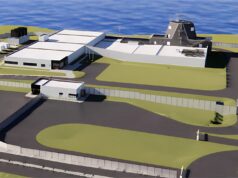
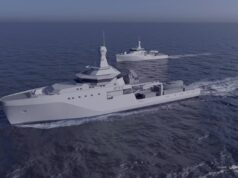
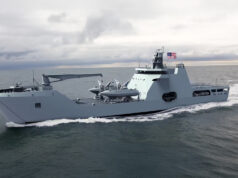
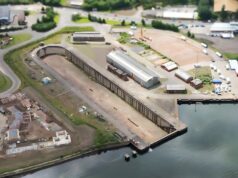
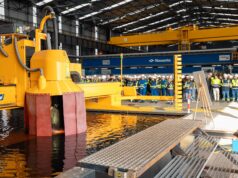
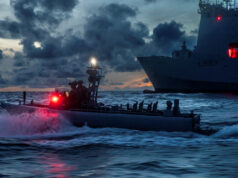

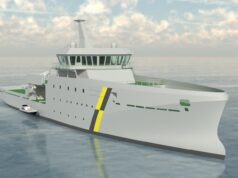

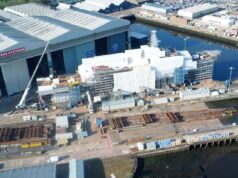

Six years from first decision to first patrol. Amazing! Congratulations to the RN and all those who have contributed over the years towards this historic achievement.
It’s incredible how fast technology went from concept and design to production and delivery during the cold war. There’s nothing like an arms raise to drive productivity and efficiency in the defense sector. If China did demonstrate a working HVAS missile with a range of 300 miles, the US would have a better one ready within 12 months to close the gap, until one is demonstrated everyone is saying 10-12 years away and then some.
The USN are amazed that the RN has managed it with just 4 boats.
‘Each of the four boats are armed with up to 16 Trident II D5 SLBMs, carrying up to 8 warheads each’ – reduced to 3 per missile for quite a few years.
4 boats is actually 3 available and more often than not 2. This comes at a human cost in terms of long patrols, family separation and extended busy maintenance periods. It’s not easy but we have dedicated crews who work bloody hard to make it happen with very little reward or recognition of their sacrifice
I agree there should have been a fifth boat as originally planned for Polaris.
With 4 it’s 1 on patrol, 1 preparing, 1 in refit and 1 spare. The RN have sometimes managed to have 2 on patrol which is astonishing – with 5 that would be much easier to manage.
Tony, remember him wanted the headlines so reduced the number of warheads the navy can carry. Thanks Tony you idiot.
Whilst I despise Tony I think we have more than enough warheads given each is far more destructive than those used in WW2.
It’s a lot easier to intercept 3 than 8.
It is eight missiles on each boat with up to 40 warheads, which given each warhead is estimated to be 7 times more powerful that those dropped in WW2 I would suggest is quite a substantial deterrent. As for intercepting them they are ballistic missiles travelling at approximately 13,000MPH so that will be some task. Finally whilst I support our deterrent can any of you suggest a realistic scenario where the UK alone uses these weapons because I cannot.
Sjb1968, not necessarily the point. It’s all about the calculus an aggressor would have to make. Take a situation like the Second World War projected forward to the present day. Say in the summer of 1943 the ASW situation in the Atlantic had not been turned round in our favour. Until then we were losing far more shipping than we could sustain. We were heading towards slow starvation and oblivion. Say Germany had continued to bomb our airfields instead of turning to the cities. Before they did this, the RAF was almost on its knees and would have not lasted for much longer. Bombing the cities saved us. If something similar were to happen today and mainland Europe had capitulated and the US couldn’t or wouldn’t reinforce us, before delivering the final blow, whether through total blockade (slow death) or actual invasion, the aggressor has to calculate whether a British PM, on his/her knees, with all conventional forces destroyed, might release a single one warhead missile (or two) to a secondary city as a warning shot. In my book, a very real possibility. And as the aggressor I would take it very seriously.
Sorry but I said realistic. Where is NATO in these scenario? France has been overrun and has not gone nuclear? Why have them if you won’t use them to save your country. That is without considering the reaction of the USA.
@ Sjb1968 You assume that the US will be there. Consider the scenario where an aggressor, e.g. Russia, conducts a successful cyber warfare program of disinformation that results in the US NOT supporting Europe because there is no political will/popular support for them to do so and actually a manufactured strong opposition against such action. This current age of Trump and a passive/compliant Republican party in power if nothing else provides a real glimpse into such a possibility.
Seems unlikely? Well consider how much it took for the US to become involved in WW1, and it took Pearl Harbor before they committed in WW2. There was a lot of anti-war action in the US prior to both.
So the existence of an independent launch UK deterrent is a very important component of overall UK defence in my view.
@ Sjb1968 You assume that the US will be there. Consider the scenario where an aggressor, e.g. Russia, conducts a successful cyber warfare program of disinformation that results in the US NOT supporting Europe because there is no political will/popular support for them to do so and actually a manufactured strong opposition against such action. This current age of Trump and a passive/compliant Republican party in power if nothing else provides a real glimpse into such a possibility.
Seems unlikely? Well consider how much it took for the US to become involved in WW1, and it took Pearl Harbor before they committed in WW2. There was a lot of anti-war action in the US prior to both.
So the existence of an independent launch UK deterrent is a very important component of overall UK defence in my view.
2nd attempt to post
Both worked !
Regardless the amount on the boat on patrol we do not possess enough to make a serious dent in Russia or china. Same for them. Yes we can ruin a city or 2 but they’re far from the doomsday device’s we perceive them to be. Arsenals from the 60s were far more potent and yet life in one way or another would of found a way
The cost of just 1 city horrified both sides in the cold war and both – apart from a few nut cases – were determined to avoid it. Fear drove the arms race.
one war head would make even one of the largest cities uninhabitable. Almost no nation would survive taking out 1 major city let alone 2 or 3.
Think of the impact to the UK economy if London was taken out.
p.s. it’s not the explosive element that does the damage, it’s the radiation fall out.
Except for the fact people still live in Hiroshima and Nagasaki. While Chernobyl is teeming with wild life. Just like as it turns the fisheries at Bikini Atoll. Radioactivity and the destructiveness of Nuclear ordnance is very often overplayed. Life always finds a way.
Most countries couldn’t recover from a major city being wiped out? I would have to disagree cities are destroyed all the time just not with nukes.Yet countries manage to recover and rebuild because as a species we are very durable.
Even the two cities that were nuked in the end were rebuilt in time. Sickness came and went. Both radiation sickness itself and the effects from exposure. Hiroshima and Nagasaki had the some of the highest rates of cancer and childhood Leukemia for roughly 15 years. This was due to either trying to sift through the rubble after the strikes or from infants getting both exposure being present and from drinking irradiated milk. In the end though the increase in cancer rates had no material effect on rebuilding.
‘Even the two cities that were nuked in the end were rebuilt in time’ – horrible though it was that was with 15kt bombs of primitive designs compared to modern warheads of perhaps 170kt yield.
@ Sjb1968 You assume that the US will be there. Consider the scenario where an aggressor, e.g. Russia, conducts a successful cyber warfare program of disinformation that results in the US NOT supporting Europe because there is no political will/popular support for them to do so and actually a manufactured strong opposition against such action. This current age of Trump and a passive/compliant Republican party in power if nothing else provides a real glimpse into such a possibility.
Seems unlikely? Well consider how much it took for the US to become involved in WW1, and it took Pearl Harbor before they committed in WW2. There was a lot of anti-war action in the US prior to both.
So the existence of an independent launch UK deterrent is a very important component of overall UK defence in my view.
Using our Trident D5’s in anger is an appalling thought to any sane person.
Yet we live in a world where the Russian government carry out aggressive destabilising actions, seemingly at will and with little thought to the constituencies of their actions.
The Russian regime only respects strength, a robust sea based nuclear capability is something to be truly feared
Trident is the cornerstone of our defence. I don’t see that changing in my lifetime regrettably.